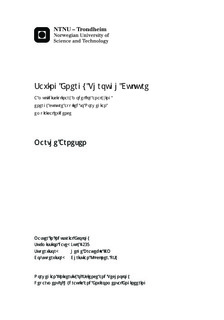Saving Energy Through Culture: A multidisciplinary model for analyzing energy culture applied to Norwegian empirical evidence
Master thesis
Permanent lenke
http://hdl.handle.net/11250/235344Utgivelsesdato
2013Metadata
Vis full innførselSamlinger
Sammendrag
As part of mitigating climate change, the last decades have seen an increasing focus on energy efficiency and reducing energy use within all areas of society, including the residential sector. However, reducing energy use in households has proven to be very complex. In Norway, energy use in households has surprisingly leveled off, but not declined, since the mid-1990s. Though, this has occured at a relatively high level compared to other countries, and has come as a result of unexpected and potentially temporary developments that were hardly the result of a coordinated effort to reduce energy use, so action is still required. For this reason, this thesis attempts to push the field of Industrial Ecology beyond its traditional techno-economic solutions to theoretical developments in the social sciences related to energy use, in particular those around the concept of energy culture. Research on energy use has traditionally focused on technological and economic solutions, and with an understanding of consumers as purely rational beings whereby energy efficiency would hold the answer. However, as this thesis shows, reducing energy use in households requires looking to the social and cultural context within which consumers live, as well as psychological constructs such as habits and social norms.The empirical evidence of this thesis is taken from eight focus group interviews done as part of a project between Enova and the project leader Professor Christian Klöckner from NTNU. Through a qualitative thematic data analysis, six themes were discovered that characterize Norwegian energy culture. One could particularly describe the current energy culture in Norway as revolving around notions of comfort, convenience and coziness. What people consider part of the good life is naturally connected to a very energy-intensive lifestyle. Using theories from social science literature, this work explains ways in which energy use can be understood as a relationship between culture, policy, regulation, technology, groups, individuals, social practices, social norms and habits. The development of an original energy culture model is also explained and used to explore energy culture as well as interventions to reduce energy use. The model emphasizes the multidimensionality of energy culture, and thus highlights the need for multidimensional solutions. For example, reducing energy use is not just about more information, the right incentives or saving money, since social practices and cultural aspects act as barriers. Policymakers should keep in mind that designing effective intervention strategies is complicated, especially as policies can lead to unexpected effects. One should also analyze how energy is culturally interpreted when introducing new technologies and policies, as it can be problematic to introduce general energy policies in atypical cultures such as Norway, where electricity is such a significant energy carrier.The main conclusion is that there is no silver bullet for desiging an intervention strategy for any culture, but that cooperation between various disciplines such as sociology, psychology as well as conventional techno-economic perspectives is needed, since energy culture, and thus energy use, happens on a multidimensional level.
